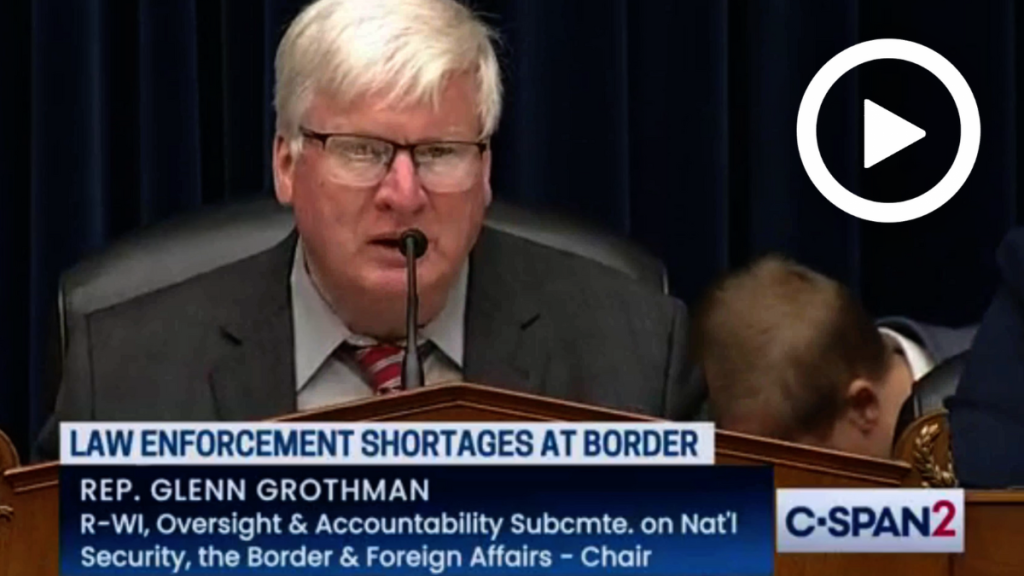Grothman: Biden Administration Policies on the Border Have Exacerbated Staffing Challenges
WASHINGTON — National Security, the Border, and Foreign Affairs Subcommittee Chairman Glenn Grothman (R-Wis.) opened today’s subcommittee hearing on “Help Wanted: Law Enforcement Staffing Challenges at the Border” by outlining how the Biden border crisis and Administration’s mishandling of resources have debilitated law enforcement and worsened existing staffing challenges. He continued by emphasizing that the staffing challenges on the border have left the men and women on the front lines of this crisis overwhelmed and stretched to their limits. Subcommittee Chairman Grothman concluded by thanking Inspector General Cuffari for appearing before the subcommittee looking forward to working with his office to ensure continued robust oversight of DHS.
Below are Subcommittee Chairman Grothman’s remarks as prepared:
On Day One of his Administration, President Biden signaled to the world through words and actions that our borders are open. And so, they were.
Our country has since watched the crisis along our southwest border devolve into a catastrophe. A humanitarian and national security catastrophe.
The deteriorating conditions along the southwest border and mismanagement of resources have harmed law enforcement and made existing staffing challenges even worse.
Just last month, the Department of Homeland Security Office of Inspector General issued a report examining how law enforcement at Customs and Border Protection and Immigration and Customs Enforcement have been negatively impacted by historically high levels of illegal immigration and other operational challenges.
For this audit, the DHS Office of Inspector General surveyed over 9,000 DHS law enforcement personnel within ICE and CBP.
They collected information from Border Patrol agents who protect our border from illegal entries, Office of Field Operations officers who guard our ports of entry, Enforcement and Removal Operations officers who enforce immigration laws, and Homeland Security Investigations agents who investigate cross-border criminal activity.
What they found is shocking.
88 percent of ICE and CBP law enforcement personnel who responded said their work location was not adequately prepared and staffed during migrant surges.
71 percent of CBP personnel and 61 percent of ICE personnel stated that their current work location was not adequately prepared and staffed even during “normal” operations.
But there is nothing “normal” about the current border catastrophe.
As noted in the IG’s report, “migrant encounters at the Southwest border have risen from approximately 978,000 in fiscal year 2019 to 2.4 million in fiscal year 2022.”
This fiscal year through the end of April, CBP has already made 1.4 million encounters along the Southwest border, with 1.2 million of those coming from Border Patrol agent apprehensions of illegal border crossers.
Each of those encounters represents law enforcement resources expended in arresting and processing those individuals.
And those resources are being used up at the expense of enforcement.
The Inspector General’s report highlights a 303 percent increase in the number of known “gotaways”—meaning migrants who evade apprehension entirely—in Fiscal Year 2022 compared to Fiscal Year 2019.
Last fiscal year there were more than 600,000 known gotaways recorded by CBP.
In one Border Patrol station reviewed by the Inspector General’s audit, 15 percent of gotaways over a 5-day period evaded apprehension simply because “no agents were available to respond.”
These challenges have left the men and women on the front lines of this crisis overwhelmed and stretched to their limits.
To meet mission requirements, DHS implements stop-gap measures like increased overtime and temporary details that exacerbate staffing challenges in the long-term by eroding morale and jeopardizing retention of experienced law enforcement professionals.
Today, we will hear from Inspector General Cuffari] on his office’s findings about the reality of the problem, how DHS is managing those staffing challenges, and recommendations to solve the staffing crisis.
Since 2016, the DHS Office of Inspector General and the Government Accountability Office (GAO) have issued 25 reports examining staffing issues at our borders, but 80 percent of their recommendations have been closed without yielding tangible results at DHS.
In fact, DHS did not concur with one of the three recommendations in this report, appearing not to even be willing to acknowledge the impact of temporary details and overtime on the workforce.
We must hold DHS accountable to achieve critical mission goals including ensuring border security, enforcing our immigration laws, and facilitating lawful trade and travel.
And that means DHS must successfully manage law enforcement resources and support the men and women who carry out these essential functions.
I want to thank Inspector General Cuffari for appearing today, and I look forward to working with his office to ensure continued robust oversight of DHS.
